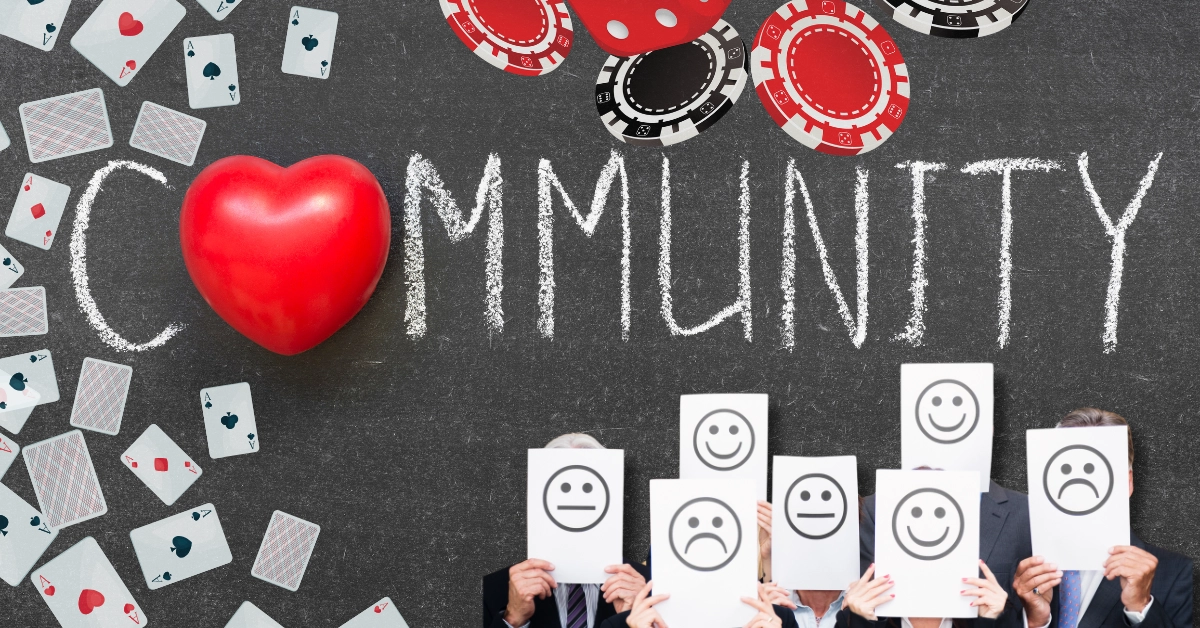The Positive and Negative Effects of Gambling on Communities

Gambling has always been a somewhat polarizing topic between people and the communities they live in. While about half of the population view it as a financial lifeline, the other half are worried about its possible harm to the more vulnerable among us. And the opposing viewpoints? Well, it makes it a subject that stirs up some debate wherever gambling happens.
The pro gambling side see it like this: Gambling has undeniable economic advantages, and that includes job creation to funding public projects via tax revenue. The other side have valid concerns about addiction, crime, and the strain on families, and these are the darker aspects that can’t be swept under the rug. Communities are up against the conundrum of finding ways to manage their impact responsibly! Is there a way to reap the benefits while mitigating harm?
We are going to look at both sides of the spectrum and find out how gambling influences communities—both its contributions and its costs.
Positive Effects of Gambling on Communities
Gambling has turned into a vital part of economic growth for a lot of regions, as it provides a host of benefits. It creates jobs, there is tourism development, and, of course, the tax revenue—its economic impact can go way past the gambling establishments themselves.
Economic Benefits
Job Creation
Casinos are job creators—and that’s a good thing! There are employment opportunities that span across several industries. You need dealers, security personnel, hospitality staff, IT professionals, and administrative roles; they are all part of the ecosystem that supports casinos and other gambling establishments. And the construction and ongoing maintenance of the facilities also bring about more opportunities for local businesses.
In fact, the U.S. gambling industry has created over 300,000 jobs nationwide, which means it brings vital income to thousands of families. In states like Oklahoma, where the industry generates an impressive $10 billion annual economic impact, gambling ranks as one of the largest employers in the region. Similarly, Native American casinos have played an important part in creating economic opportunities, which is needed in historically underserved areas.
And the growth of online gambling sites has further expanded job opportunities, as it needs skilled professionals in tech, marketing, and customer support. The diversification means that urban and rural communities both benefit economically.
Tourism Growth
Some gambling establishments are now full-blown destinations that transform areas into tourism hubs, and they bring in visitors from all over who want entertainment, luxury, and unique experiences all rolled into one trip. An influx of tourists not only fuels the gambling industry but also stimulates the local economy—it brings business to other hotels, restaurants, and shops.

Macau is a perfect example of how gambling can totally transform an entire region. It’s referred to as the “Monte Carlo of the East,” and Macau’s casinos bring in millions of visitors annually—it’s one of the most profitable gambling destinations in the world. The local economy thrives on the influx, and tourists contribute to everything from luxury retail sales to transportation services.
In some smaller regions, casinos serve as anchors for tourism campaigns, and that promotes other attractions in the area. In Oklahoma and Mississippi, gambling venues have been leveraged to draw in visitors, and that boosts the overall hospitality industry in their respective states.
Increased Tax Revenue
One of the most tangible benefits of the gambling industry? The amount of tax revenue it generates. Governments use the funds to support public services, and that includes education, infrastructure, and healthcare. In states like Nevada and New Jersey, gambling tax revenue forms a large part of the budget, and this enables the regions to fund important programs without overburdening taxpayers.
The U.S. gambling industry generates approximately $240 billion annually, with a portion of this going directly to state and local governments. The contributions go toward supporting schools, road maintenance, and public health initiatives, which demonstrates the bigger societal benefits of gambling revenue. And some jurisdictions also allocate a portion of the funds specifically for gambling addiction prevention programs, and that addresses the downsides while also maximizing the public benefit.
Community Development Programs
In addition to economic benefits, gambling operators also contribute to community development via targeted programs and charitable initiatives.
Charitable Contributions
Most gambling companies make it a priority to give back to the communities that they serve. Donations to education, healthcare, and environmental causes are very common.
- For instance, the San Manuel Band of Mission Indians in California has donated millions of dollars to initiatives like the UCLA Law School’s American Indian Studies program, which highlights how gambling revenue is capable of giving support to underfunded areas.
- The trend isn’t unique to the U.S., either. In the UK, the Betting and Gaming Council (BGC) donated a record £172.5 million to help defray gambling-related harm and fund community projects in 2024. The contributions don’t just improve the community’s quality of life—they also show the industry’s willingness to address its social responsibilities head-on.
Revitalizing Struggling Areas
In regions that are facing economic decline, gambling establishments have been seen as a pathway to revitalization. Cities like Detroit have introduced casinos as part of bigger efforts to rebuild their local economies, and that creates jobs and attracts tourism in the process.
The success of gambling hubs in smaller towns underscores their potential to turn struggling communities into more prosperous destinations. When a focal point for investment and development is created, gambling establishments are able to rejuvenate areas that could otherwise lack economic opportunities.
Entertainment Value
Gambling has a lot more than financial benefits on offer; it serves as a recreational activity that brings people together. Casinos are almost always paired with entertainment venues, fine dining, and shopping, meaning it’s a whole experience to be had for its visitors.
Las Vegas has exemplified this approach—almost all of its casinos are integrated into a bigger ecosystem of shows, restaurants, and luxury shopping. Visitors come not just to gamble but also to see live concerts, magic shows, and sporting events! It’s a cultural hub that benefits the broader community.
Even smaller casinos and online gambling platforms add to this by providing fun pastimes. There are multiplayer games, tournaments, and live events that add a social element so that players are able to connect with one another. This fosters a space where gambling is part of a larger entertainment experience.
Negative Effects of Gambling on Communities
The drawbacks of gambling can be big and harmful, particularly when its presence isn’t carefully managed. While the financial benefits are evident, the social and ethical costs can be a strain on communities, and it affects individuals, families, and local economies. From addiction and crime to challenges for small businesses, the issues are obvious to why gambling is still a sore spot for so many people. Below, we get into all of the prescient areas of concern for communities!
Social and Ethical Concerns
The social and ethical impact of gambling is usually front and center in any and all discussions about its effects on communities. Yes, most people only gamble for entertainment—but others will struggle with life-altering consequences if it gets out of hand.
One of the most serious issues that surround gambling is its link to addiction. Problem gambling doesn’t just impact the person suffering—it sends shockwaves through families and neighborhoods. Those who develop a dependency on gambling can find themselves trapped in cycles of debt, lying to loved ones, or possibly turning to criminal activities to fund their habits.
In the United States alone, studies say that millions of people struggle with gambling addiction, and its effects extend to their families and loved ones. Financial instability can result in evictions, repossessions, or bankruptcy, and that means entire households are at risk. Past the financial losses, addiction erodes trust in relationships, isolates individuals socially, and contributes to serious mental health issues like anxiety or depression.
Communities also feel this burden—the need for addiction counseling services, mental health support, and intervention programs puts an additional strain on local resources. Governments and charities usually step up and in to fill the gaps, but the efforts are rarely able to keep pace with the demand for help.
Crime tends to go up in areas with a strong gambling presence. This is due to the availability of cash, and it’s combined with the desperation that problem gambling can cause. It can lead to theft, fraud, or, sometimes, organized crime.
Think about the urban areas where casinos are prominent- there are studies that suggest that petty crimes like pickpocketing and shoplifting go up, as does white-collar crime like embezzlement. Gambling addiction has caused people to commit fraud at their workplaces or target family members financially. And gambling establishments have been linked to money laundering schemes, which further complicates the picture.
Local law enforcement has a hard time addressing any spikes in criminal activity, especially if the resources are already stretched thin. While gambling revenue can help fund police departments, the relationship between crime and gambling is still a serious challenge for communities to negotiate.
Gambling also stirs up ethical and cultural debates, particularly in the more conservative or religious areas of the world. A lot of people see gambling as being inherently immoral, as they associate it with greed or vice. The objections cause a really strong resistance when any new gambling establishments are proposed.
In rural towns or communities that are rooted in specific cultural traditions, the introduction of casinos or betting shops can be seen as a threat to their very way of life. Even in the more urban settings, opposition groups have raised concerns about how gambling could erode social values or encourage risky behavior among youth.
This type of pushback has, in some cases, prevented the establishment of gambling hubs. But the debate rarely ends there, as communities still have to grapple with the societal implications of the already existing gambling activities.
Economic Drawbacks
While gambling is frequently touted as being a powerful economic driver, it does come with its own financial risks and challenges for communities.
A big criticism of gambling is how it tends to take money from those who can least afford to lose it. Lower-income individuals are usually more vulnerable to the lure of gambling, as they tend to see it as a way to improve their financial situations. Unfortunately, this gamble rarely, if ever, pays off and can worsen economic inequality.
Take neighborhoods where casinos are easily accessible—the residents with limited resources may prioritize gambling over essentials like rent, groceries, or medical care. In some cases, they might turn to predatory loans or credit cards to fund their habits, and that creates long-term financial damage.
The disproportionate impact raises grave ethical questions about the fairness of gambling’s economic contributions. While tax revenue does benefit public projects, much of it comes from those who can least afford the loss, and that’s a troubling dynamic for communities.
Another economic concern is how gambling establishments can overshadow or even harm smaller businesses in the local area. Casinos, especially the larger ones, usually function as all-in-one destinations. Visitors will probably spend their money only within the casino’s ecosystem, which leaves very little for the surrounding businesses.
The small restaurants, shops, or family-owned venues that are located near a major casino will struggle to compete with the convenience, promotions, and entertainment that’s offered by larger gambling hubs. Over time, the imbalance can hurt local economies, and it makes them too reliant on the success of the gambling industry.
And the communities that depend heavily on gambling revenue also can face financial vulnerability during economic downturns or shifts in consumer habits. If a casino or gambling hub loses popularity, the surrounding area could suffer from a significant economic fallout.
Health and Social Well-being
In terms of economic and social challenges, gambling can have a profound effect on the mental health and overall well-being of people and families.
The connection between gambling addiction and mental health struggles has been well-documented. People who gamble excessively usually have heightened anxiety, depression, and sometimes suicidal thoughts. The stress of financial losses and the guilt of harming their loved ones compound these feelings, and that makes the road to recovery even harder.
If someone has lost significant amounts of money by gambling, they will probably feel a sense of hopelessness or self-blame, and that can result in isolation or self-destructive behavior. Mental health services play a critical role in supporting these individuals, but not all communities have enough adequate resources to address the scale of the problem.
In some cases, the presence of gambling establishments only exacerbates the issues by normalizing any kind of risky behavior. This creates an environment where vulnerable people are much more likely to develop harmful gambling habits.
Families often bear the brunt of problem gambling. Financial strain is one of the most immediate consequences—there are households that are struggling to pay bills or meet basic needs due to gambling losses. But the impact goes beyond money.
Trust and communication within families can break down when one member is hiding their gambling habits or racks up debts without anyone else knowing. Spouses will very likely feel betrayed, and children can suffer from a lack of stability. In extreme cases, gambling-related stress is the cause of separations, divorces, and domestic disputes.
The community at large also feels these effects. Schools, healthcare providers, and social services will step in to support any families in crisis, which means there is an additional demand for already stretched resources.
Balancing the Pros and Cons
Communities face a delicate balancing act when it comes to gambling. Yes, the economic advantages are good, but the social and ethical drawbacks demand serious attention. Finding a middle ground involves proactive strategies, regulations, and community involvement to maximize benefits while minimizing harm.
Strategies for Responsible Gambling
Responsible gambling initiatives can greatly decrease the negative effects of gambling—they are aimed at educating the public, protecting vulnerable populations, and promoting healthier habits!
Self-Exclusion Programs
Self-exclusion programs are when individuals voluntarily ban themselves from gambling establishments or online gambling sites. It’s a good tool for those who are struggling with addiction, and it gives them a better semblance of control over their gambling habits.
Take the example of voluntary exclusion programs in countries like Canada or the UK. The systems are designed to prevent access to casinos or betting apps and are paired with counseling and support services. By removing the temptation, the programs help people regain the stability they once had in their lives.
Gambling Education
Educating people about the risks of gambling is another super effective way to address its negative effects. Schools, workplaces, and community centers can offer workshops or resources that teach people how to gamble responsibly!
There are campaigns like public service announcements or social media outreach that showcase the real dangers of gambling addiction. The efforts go a long way in raising awareness and encouraging people to approach gambling with caution.
Tools for Addiction Prevention
Modern technology has introduced a lot of powerful tools that can help people monitor and manage their gambling habits. There are budget trackers, time-limit reminders, and spending caps, and all are increasingly being offered by online gambling sites in order to promote responsible behavior.

Including these tools as standard features on gambling platforms guarantees that all users have the resources to stay within their limits. Governments and regulatory bodies play an important role in making all of these safeguards mandatory across the industry.
Regulatory and Community Roles
The role of governments and local communities is also central to making sure that gambling’s benefits are harnessed responsibly while its harms are mitigated.
Effective Regulations
Governments must implement and enforce regulations that protect individuals and uphold fairness within the gambling industry. Licensing requirements, advertising restrictions, and mandatory contributions to community funds are just some of the ways that authorities can ensure gambling operates responsibly.
Consider the example of Sweden, which introduced strict gambling regulations to curb addiction while maintaining a state-controlled monopoly. This approach balances economic benefits with protections for vulnerable populations.
Including restrictions on high-risk activities, such as credit-based gambling, is another effective regulatory measure. By reducing access to risky behaviors, governments can help safeguard individuals from financial and social harm.
Community Involvement
Local communities also play a vital role in how gambling impacts areas. Town hall meetings, public consultations, and advocacy groups all allow residents to voice their concerns and influence any decisions that are made about gambling establishments in their areas.
Take the efforts of grassroots organizations that lobby for better funding for addiction services or tighter regulations on casinos. The groups amplify the voices of those directly affected by gambling, and that guarantees that any policies reflect the needs of the community.
Collaboration between governments, gambling operators, and local organizations can build a much more balanced approach. Public-private partnerships that fund addiction recovery programs are an example of how stakeholders can work together to address any of gambling’s challenges.
Conclusion: The Verdict? Gambling is a Mixed Bag
It’s not a simple black-and-white issue—there are so many gray areas! Gambling is neither purely beneficial nor wholly destructive—it’s a nuanced issue that affects communities in all kinds of different ways. And meeting in the middle takes an understanding of both the positives and the negatives, as well as a strong and continuing commitment to responsible practices.
Keep reading for a recap of the positive and negative effects of gambling on communities:
- Economic benefits: Gambling creates jobs, boosts tourism, and generates tax revenue for public projects.
- Social and ethical concerns: Addiction, crime, and cultural opposition all show there is a darker side of gambling.
- Economic drawbacks: Gambling can disproportionately affect lower-income people and hurt small businesses.
- Health and well-being: Mental health struggles and family strain are really common outcomes of problem gambling.
- Solutions: Responsible gambling strategies and effective regulations can help communities manage any impact gambling has.
When it is approached in a responsible way, gambling has the potential to uplift communities and fund important initiatives. But we can’t ignore the possible risks just because there are benefits. There must be supporting education, advocating for better regulations, and furthering community dialogue. That way, we can make sure that gambling’s benefits are not offset by its harms.
FAQs
We get a lot of feedback on this particular issue, and for good reason! Below are some of the most frequently asked questions our readers have sent us about this sensitive topic.
What Are the Economic Benefits of Gambling in a Community?
Gambling can boost local economies by creating jobs, attracting tourists, and generating tax revenue. The funds are used for public projects like schools, infrastructure improvements, and more healthcare services.
How Does Gambling Negatively Affect Families?
Gambling addiction can cause financial instability, emotional stress, and broken trust within families. In the most severe cases, it can cause separations or divorces, and that will leave long-lasting emotional scars for those impacted.
Can Gambling Reduce Unemployment Rates?
It can! Gambling establishments do create lots of job opportunities, and they range from customer service roles to administrative positions. But the long-term sustainability of these jobs all depends on the overall health of the gambling industry in the area where it is located.
What Measures Can Prevent Gambling Addiction?
Self-exclusion programs, educational campaigns, and tools like spending caps are all effective ways to stop gambling addiction before it starts. Governments and gambling operators have to work together to make sure that these resources are widely and readily available.
Is There a Way to Balance Gambling’s Benefits and Drawbacks?
Balancing gambling’s effects takes a combination of strong regulations, community involvement, and responsible gambling strategies. Transparent policies and collaboration between stakeholders can help communities harness its benefits while decreasing any harm.

Alyssa contributes sportsbook/online casino reviews, but she also stays on top of any industry news, precisely that of the sports betting market. She’s been an avid sports bettor for many years and has experienced success in growing her bankroll by striking when the iron was hot. In particular, she loves betting on football and basketball at the professional and college levels.







